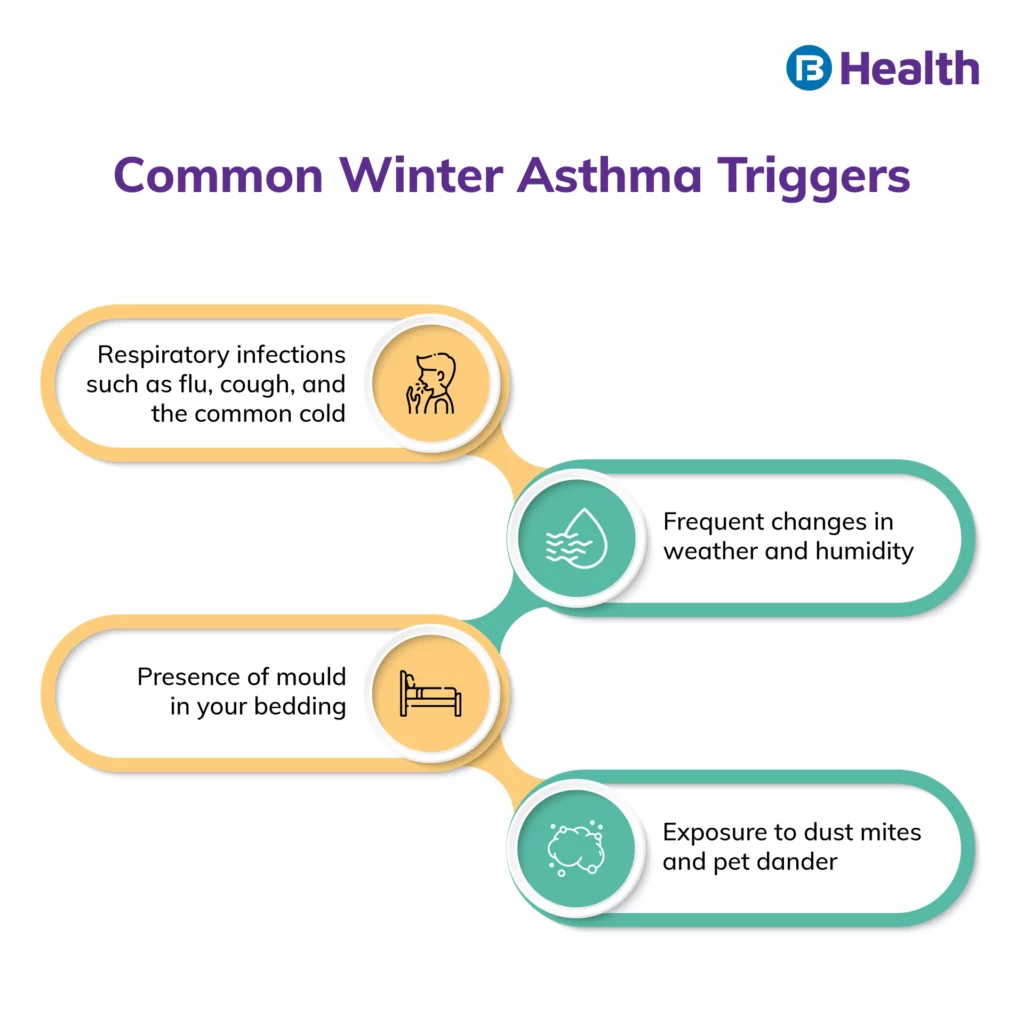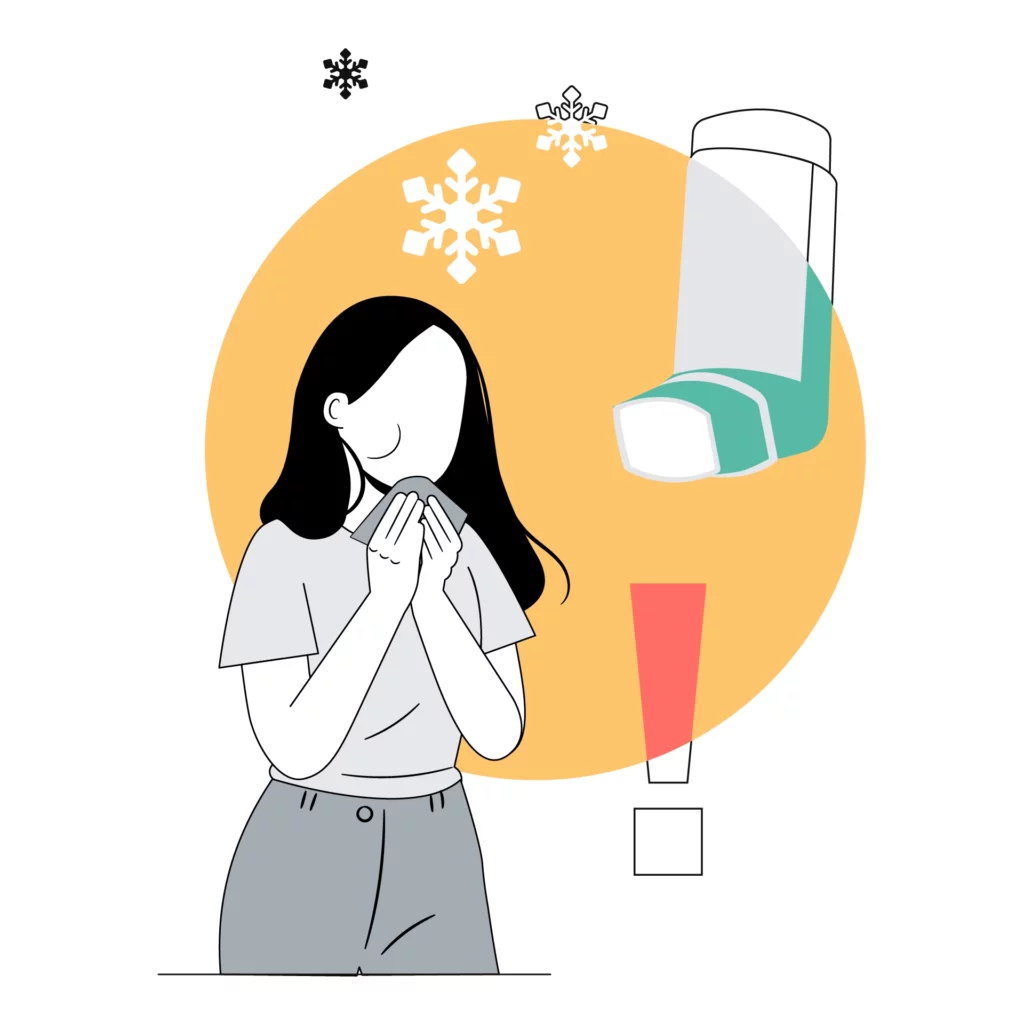General Health | 5 min read
Winter Asthma: Means, Triggers, Health, Treatment
Medically reviewed by
Table of Content
Synopsis
As per a 2019 study, around 262 million people worldwide are affected by asthma. But what is winter asthma, and what makes it so difficult? Read on to find out.
Key Takeaways
- Winter is usually the most difficult time for individuals with asthma
- For effective management of asthma, having an Asthma Action Plan is crucial
- If you use an inhaler, make sure to carry it wherever you go
Asthma is a long-term condition affecting the lungs and other airways in children and adults. As per a 2019 study, around 262 million people worldwide are affected by this condition [1]. Among the different types of asthma, winter asthma is a condition which can trouble individuals with asthma badly. Read on to learn about asthma in the cold and its risk factors, and find out how to manage it efficiently.
What is Winter Asthma?
Asthma and cold weather are known to come hand in hand. For people with asthma, winter is usually the most challenging time of the year. The cold and dry climate of winter, accompanied by frequent changes in weather, can affect your airways. As a result, your respiratory system starts producing more mucus, which blocks a part of your airways, causing winter asthma. In addition, there may be mild or severe asthma attacks based on your condition and preventive or treatment measures taken.

Why Asthma Gets Worse In Winter
Though individuals with asthma may experience symptoms throughout the year, there is nothing worse than asthma in the cold. In cold weather, there are always the following risk factors for winter asthma:
Dry air
Due to the lack of humidity, cold air dehydrates your body in no time. Unfortunately, in the process, the layer of fluid that guards your airways gets evaporated, leading to irritation and swelling in your airways.
Respiratory infections
There is another protective layer of your airways, which is formed by mucus. In dry and cold weather, the layer of mucus thickens and blocks your airways. As a result, you may get respiratory illnesses such as the flu or the common cold. These conditions may irritate and inflame your airways, triggering asthma symptoms.
Exposure during outdoor exercise
Daily morning walks or jogs may also become a possible risk factor for asthma during winter. As you breathe in cold air during your outdoor exercise, there are high chances of catching a cold with associated conditions like cough, headache, and breathlessness.
Additional Read: Ayurvedic Health Tips to Manage Symptoms of AsthmaCommon Winter Asthma Triggers
When it comes to preventing, managing, or treating winter asthma, the first step is identifying the triggers. During this time, the following objects or conditions play a crucial role in triggering asthma:
- Dust mites
- Cold weather
- Respiratory infections
- Mould
- Pet dander (as you spend more time at home) [2]
Winter Asthma Treatment
Remember, no treatment can cure asthma, but there are remedies for effectively managing the condition. Oxygen therapy and bronchodilators are two of the most common treatments for asthma. In case of severe asthma, doctors may also recommend steroids. Major bronchodilators and steroids are available as tablets, syrups, and inhalers.
Once doctors come up with an Asthma Action Plan for you, it is prudent to follow it thoroughly. For example, if you are given an inhaler for asthma management, don’t stop using it when you feel better. These inhalers usually continue throughout the year to keep your asthma symptoms in check. Apart from that, it is essential to ensure the following:
- You are keeping your prescriptions updated
- Your Asthma Action Plan covers how to manage the condition when you have mild and severe symptoms or no symptoms at all
- Keep a note of your triggers, symptoms and medications. This can help doctors get a comprehensive idea of how the condition affects you

Tips You Can Follow To Avoid Winter Allergy
Apart from the asthma treatment, there are certain measures you can take to keep your winter asthma symptoms in check. Here’s a look at them:
- Keep yourself hydrated by drinking a lot of water
- Take a seasonal break from outdoor exercise; work out in a gym or at home
- Get yourself covered with warm outfits while going out
- Wear a mask to make the air a bit warm before you breathe in
- Keep your hand sanitized to avoid viral cold
- Don’t touch your face if your hands are not clean
- Get flu and COVID-19 vaccines on time
- Carry your inhaler wherever you go
- Keep your Asthma Action Plan handy so that you can refer to it anytime
- Don’t allow dampness to settle in your room; it may boost the growth of mould and dust mites
- Check the time you spend with pets if pet dander is an asthma trigger for you
Conclusion
Be it prevention, treatment or management of winter allergy, forming an Asthma Action Plan in consultation with your doctor is key. Though winter asthma can be genetic, other environmental factors play a crucial role. Once the Asthma Action Plan is ready, the next thing to do is to follow it without fail. This will help you keep your asthma symptoms in check. If you want quick expert advice regarding the same, book an online or offline consultation with a doctor on Bajaj Finserv Health. Stay updated with the asthma treatment remedies to breathe free and lead a healthier life!
FAQs
Why is cold weather bad for people with asthma?
- Erratic weather: Due to the dry air and fluctuations in temperature throughout the day, the winter in India becomes a difficult time for people with asthma
- Ailments: There are high risks of getting cold and flu during winter, and both can cause your airways to swell up. In such a situation, small triggers of asthma can cause big troubles
- Time spent indoors: During winter, it is quite common to spend extra time at home due to extreme weather conditions. However, this exposes you to indoor allergens such as dampness, mould, dust mites, and pet dander. Make sure to change and clean your bedding regularly to prevent allergens from settling in
Does outdoor exercise trigger winter asthma?
Yes, outdoor exercise is one of the key triggers of winter asthma. However, if it is a thing you cannot avoid, it is wise to do a warm-up indoors before leaving home for the workout.
References
- https://www.who.int/news-room/fact-sheets/detail/asthma
- https://www.cdc.gov/asthma/triggers.html
Disclaimer
Please note that this article is solely meant for informational purposes and Bajaj Finserv Health Limited (“BFHL”) does not shoulder any responsibility of the views/advice/information expressed/given by the writer/reviewer/originator. This article should not be considered as a substitute for any medical advice, diagnosis or treatment. Always consult with your trusted physician/qualified healthcare professional to evaluate your medical condition. The above article has been reviewed by a qualified doctor and BFHL is not responsible for any damages for any information or services provided by any third party.





